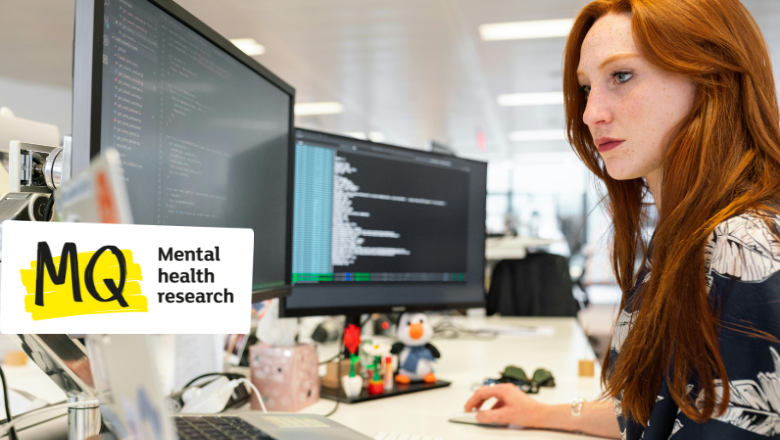Internationally, 33.3% of researchers are women, which is why at MQ we are incredibly proud to say we fund male and female researchers equally. In the run up to International Women’s Day (8th of March) we celebrate those women who make up 50% of our researchers, and their pioneering work.
Women Working on Preventions and Interventions
Dr Susanne Ahmari, (USA) identified brain activity related to Obsessive behaviours, the first step towards developing new treatments for OCD in 2013.
In 2014, Dr Andrea Reinecke (UK) developed a life changing intervention for panic disorder that combined CBT and a blood pressure drug into a treatment that only needed to be.
Professor Petra Vértes (UK) used genetics to improve understanding of the biological underpinnings of Schizophrenia in 2017.
In 2017 Dr Claire Llewellyn (UK) identified some childhood eating behaviours as potentially predisposing risk factors to future onset of eating disorders.
Dr Ruchika Gajwani (UK) is working on improving the detection and diagnosis of young people with borderline personality disorder (BPD) beginning in 2021.
Women Working to Help Children and Young People
In 2014 Professor Helen Fisher (UK) uncovered the key factors that lead to the development of psychotic symptoms in children, which led to improvements in clinical interventions for vulnerable young people.
Dr Teresa Tavassoli (UK) in 2017 shed light on the relationship between sensory differences and mental health symptoms in autistic children.
In 2018, Dr Rachel Hillier (UK) used data to map and better understand the mental health needs of young people growing up in care.
Professor Liz Twigg (UK) used survey data on adult and children's mental health, social media use and parent-child relationships to understand how children's wellbeing is affected in 2018.
Dr Katherine Young (UK), who later handed the project over to Dr Colette Hirsh, investigated the impact of the pandemic on young people’s mental health 2021.
“MQ has been incredibly helpful in allowing me to reach my recruitment targets. Within days, I had more participants [thanks to Participate] than the previous six months altogether! The team have also been brilliant[1]responsive and kind in all correspondence.” Dr Gemma Sharkey (UK)
Women Increasing Hope for Those with Depression and Anxiety
Professor Bronwyn Graham, (Australia) found in 2013 that women with anxiety, who had low levels of the hormone oestrogen, were less likely to get better – and stay better – following psychological treatment. This means that if we can schedule treatment when oestrogen is highest, it could end up being more effective.
In 2016, Dr Claire Gillan (Ireland) created an internet-based tool which uses AI to predict how effective antidepressants will be for different individuals.
Dr Ethel Nakimuli-Mpungu (Uganda) developed a highly successful intervention for remote communities living with HIV and depression in 2015.
“Ethel Mpungu’s work is an amazing example of interdisciplinary thinking. MQ has been catalytic for what she’s done and what she’s done is catalytic not only for Uganda but far beyond.” Professor Emily Holmes, MQ founding trustee
Women Creating Revolutionary Treatments
In 2016, Dr Jennifer Wild (UK) developed a treatment for PTSD in healthcare workers that has a 90% success rate in reducing symptoms.
In 2014, Dr Andrea Reinecke (UK) developed a life changing intervention for panic disorder that combined CBT and a blood pressure drug into a treatment.
In 2017, Dr Jessica Eccles (UK) found that a novel treatment was effective in reducing anxiety in people who have hypermobility.
Women Working on Data Innovation
Dr Rina Dutta (UK) developed a unique dataset of linked educational and clinical data to better understand suicide and self-harm in 2017.
Dr Aideen Maguire (UK) used population wide data to improve the understanding of the link between access to firearms and suicide in Northern Ireland in 2017.
Professor Louise Condon (UK) supported in 2018 found that by using routinely collected health data it was possible to make visible the mental health needs of gypsy-traveller populations, one of the most underserved groups.
In 2017 Professor Jessica Deighton (UK) used large data sets to identify how treatment services could be better tailored to young people.
“Thanks to MQ, in addition to addressing the objectives and answering our research questions, we uncovered new insights and questions about unpacking the role of structural inequalities in research.” Professor Jessica Deighton
Women Preventing Suicide and Preventable Disease
In 2023 Dr Amy Ronaldson (UK) began researching why people with severe mental illnesses are more likely to die from infectious disease than people without them
Beginning in 2023, Dr Marisa Marracini (USA) is co-designing a virtual reality tool to help adolescents who have been hospitalised for suicide-related crisis.
Dr Leslie Johnson (USA) is adapting and testing an existing treatment for people with type 2 diabetes in order to treat patients with type 1 diabetes, starting her research in 2023.
Senior Research Fellow, Alexandra Buton (UK) began exploring whether social prescribing can prevent people with serious mental illnesses from developing cardiovascular diseases in 2023.
Mental illness can affect us all, regardless of gender identity. We at MQ are passionate about improving the future for every one of us since we all have mental health and can experience challenges. Your support will help our researchers continue to create a mentally healthier future for us all.



